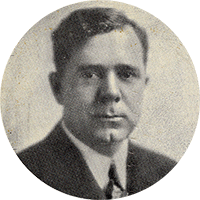
~ Courtesy of LSU Libraries Special Collections.
In the Louisiana legislative session following the impeachment debacle, opponents blocked Huey’s proposals for a major road-building initiative and the construction of a modern capitol building in Baton Rouge to house all departments of government. Huey countered by announcing he would run for the U.S. Senate in the fall of 1930 as a referendum on his programs. He promised to resign the governorship if he lost the Senate race; but a win would signal to the legislature where their constituents stood.
Huey responded that he was still governor because he had not taken the oath of office as Senator. He called out the National Guard to secure the capital city and declared that Cyr had vacated his office by taking the oath for the governorship.
The courts agreed, and under state rules the president of the state senate, Alvin O. King, became Lt. Governor. With his friend set to succeed him, Long resigned as governor and left for Washington.
Long soundly defeated incumbent Senator Joseph E. Ransdell, but he left the Senate seat vacant for nine months for fear that Lt. Governor Paul Cyr would roll back his reforms once Huey left for Washington. (In response to critics, Long quipped that the seat had already been vacant 32 years under Ransdell.) After a bungled attempt by Cyr to seize the governorship, Long ally Alvin O. King became Lt. Governor, allowing Huey to take his seat in the Senate.
Huey continued to be in effective control of Louisiana after the next gubernatorial election, when he successfully campaigned for Oscar K. Allen, a childhood friend and loyal supporter, who followed Long’s instructions in the governor’s office. He frequently traveled back to Baton Rouge to push his programs through the legislature, including abolishing the poll tax and creating a homestead tax exemption for personal property.
Huey arrived in Washington in January 1932. As the Great Depression worsened, he made impassioned speeches in the Senate charging a few powerful families with hoarding the nation’s wealth. Noting that 95 percent of the nation’s wealth was held by only 15 percent of its people, Huey urged Congress to address the inequality that he believed to be the source of the mass suffering. How was a recovery possible when twelve men owned more wealth than 120 million people?
In 1934, Huey unveiled a program of reforms called Share Our Wealth to redistribute the nation’s wealth more fairly, capping personal fortunes at $50 million (later lowered to $5 - $8 million) and distributing the rest through government programs aimed at providing opportunity and a decent standard of living to all Americans. Huey believed his programs in Louisiana were effective in lifting people out of poverty, and he wanted to implement this philosophy nationally.

Huey Long arrives in Washington by train ~ Courtesy of LSU Libraries Special Collections.
Huey accused both parties of selling out to big business at the expense of the American people. He became very unpopular with the political establishment in Washington and was labeled a “socialist,” “radical,” “demagogue,” and “dictator.” Soon the conservative national media joined the “anti-Long” bandwagon and echoed the negative portrayal of Huey from the Louisiana newspapers.
Huey countered the negative press by taking his case straight to the people through national radio broadcasts, speeches to large audiences, and the creation of his own newspaper, The American Progress. While Long’s pull-no-punches style won him few friends in Washington, his message struck a chord with average Americans. By the summer of 1935, Huey’s Share Our Wealth clubs had 7.5 million members nationwide, he regularly garnered 25 million radio listeners, and he was receiving 60,000 letters a week from supporters (more than the president).

~ Courtesy of the State Library of Louisiana.
In the presidential election of 1932, Huey had supported the candidacy of Franklin Delano Roosevelt, believing him to be the only candidate that shared his philosophy for wealth redistribution. Long played a critical role in securing the Democratic nomination for FDR and campaigned for him in the Midwest. However, Huey broke with Roosevelt when the new president failed to embrace his programs. Huey considered FDR’s first New Deal reforms to be woefully inadequate and threatened to run for president himself in 1936.

Huey Long campaigning with Oscar K. Allen; note the elephant at bottom right ~ Courtesy of the State Library of Louisiana.




